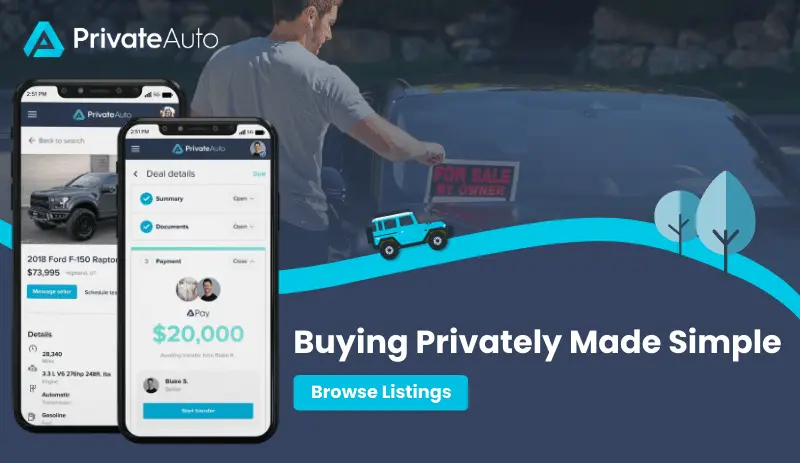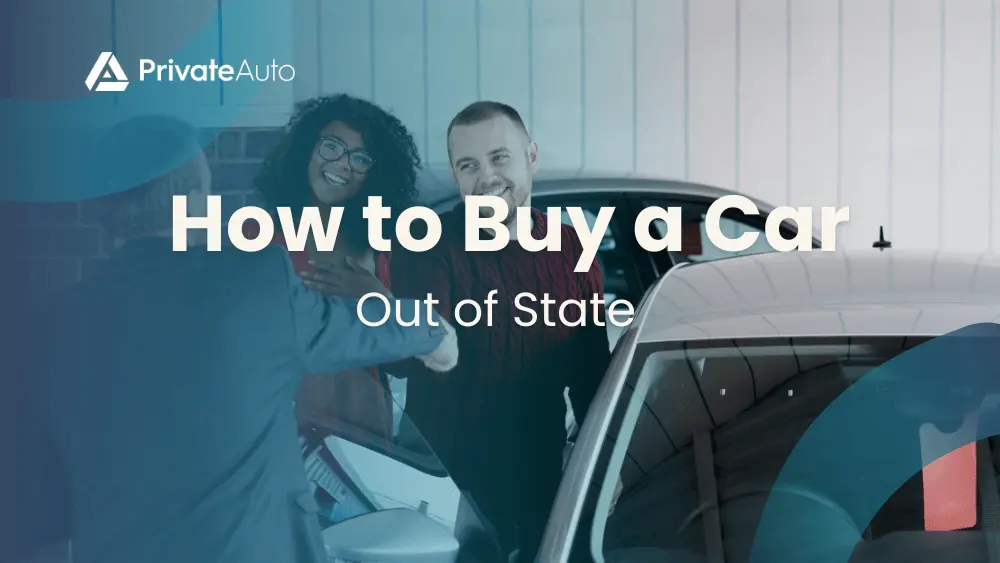- What if the car is a lemon?
- What if it is in worse condition than advertised?
- How can I pay for the car if I’m hundreds of miles away?
- How will the car get to me?
Each of these points is easily solved, and you can often get a much better deal with when you buy a car long-distance.
Shop private-party used vehicles for sale by owner on PrivateAuto. We simplify what was a complicated process and make it easy for you to buy an out of state vehicle securely and quickly.
Steps for Buying a Car Out of State
1. Find your dream car at a reasonable price and make an offer (PrivateAuto, lets you offer less than the asking price, and the current owner can accept, reject, or counteroffer).
2. Have your funds ready (if you need to apply for used car financing, you can do so right in the PrivateAuto app; when approved, your profile will show “Verified Funds” so that the seller knows you mean business).
3. Get a vehicle history report (included in the seller’s PrivateAuto listing if they’ve opted for Premium).
4. Arrange a trusted car inspector to act as your agent and schedule a meeting between the inspector and seller. PrivateAuto has integrated Lemon Squad into our tech stack, so you can order a car inspection as a step within your PrivateAuto dealflow.
5. Order car transport. PrivateAuto has integrated with RunBuggy, so you can schedule secure vehicle shipping from within the PrivateAuto app as part of your transaction flow.
6. The inspector will perform a pre-purchase inspection and test drive the car on your behalf.
7. After the vehicle inspection turns up no issues, you and the seller sign the bill of sale in the PrivateAuto app. You’re now safe to pay since the seller has signed a legally-binding contract.
8. Pay for the car. Transfer any amount to the seller instantaneously via our integrated banking gateway, PrivateAuto Pay (works any time of day, any day of the week).
9. The seller signs the vehicle title over to you and hands it to the inspector, who will send it to you by certified mail.
10. The inspector ensures the car is loaded onto transport and shipped off to you.
11. You insure the vehicle. You can compare policies and get car insurance from your PrivateAuto dashboard, thanks to our Insurify integration. Or, you can call your insurance company and have them add the car to your existing policy.
12. Complete the registration process with your local DMV. You’ll also finish the title transfer, get new license plates, and pay any applicable vehicle sales tax.
13. Enjoy your car!

Should I buy from a private seller?
Where is the Best Place to Buy a Used Car?
Buy Privately
Lucky for you, PrivateAuto has a wide selection of used vehicles for sale across the US. We offer security and many convenience features no other competitor has.
What is the best car-buying site?
Choose the Right Online Platform
- Local classifieds websites (for example, KSL Cars in Salt Lake City)
- National classifieds sites such as Craigslist
- Auction sites such as eBay Motors or Bring a Trailer
- Online marketplaces such as CarGurus or Autotrader
- Social media marketplaces such as Facebook Marketplace
While these websites may have a lot of vehicles, they have serious shortcomings. Most of them mix dealer inventory with private sales, making it difficult for you to know whether you’re getting a private-party car or not. Even more importantly, all of them lack basic transactional infrastructure.
We call them “meetingplaces” because they introduce you to a private seller and leave the two of you to navigate all the complexities of the transaction on your own.
PrivateAuto is the world’s first and only fully transactional automotive marketplace, offering self-service technological solutions for every stage of the deal.
We have nothing against other listing sites. If you find the perfect car on one of them, good for you. But we want you to have the transactional security and convenience that our users enjoy.
That’s why DealNow was created. DealNow is the easiest way to close your own vehicle deal, anytime. It’s the safe and simple way to avoid fraud, sign documents, and instantly transfer money, all in one app. Invite the seller to DealNow and fast-track your transaction.

How to finalize with the DMV?
What Should I Ask a Seller When Buying a Car Out of State?
- Why are you selling this car?
- How long have you owned it?
- Tell me about its maintenance history?
- Who was the main driver of the vehicle and what were their driving habits?
- What sorts of driving conditions was the car mostly driven in?
- When not being driven, where was the car parked?
- Is the car under warranty? (Most used cars are not under warranty, but if this one is, that’s great news.)
- Have any major modifications or repairs been done to it?
- Do you have copies of your service records?
- Does the car have a clean title? (If it has a branded or salvage title, you definitely want to know this before arranging an inspection.)
You can communicate with the seller via the PrivateAuto app without ever revealing your contact info. This safeguard goes a long way toward protecting you from car-buying scams.
Buying a Car Out of State FAQ
What are the pros and cons of purchasing an out-of-state vehicle?
Pros:
– Wider search field
– Possibility to find more unique cars
– Save money by potentially getting a better deal
Cons:
– More complicated
– Transportation of vehicle
– Requires more research
Do I need a temporary registration?
If you’re planning to drive the car home across state lines, you’ll need temporary tags. If you’re shipping the car, you don’t need to worry about temporary registration—just register the car for real once it arrives at your door.
Who pays the car title transfer fees in private car sales?
When applying for a new car title, the buyer is responsible for paying the title transfer fee. The buyer will also pay registration fees, sales taxes, and license plate fees.
How to protect yourself when buying a vehicle privately?
To protect yourself when buying a car privately, we recommend the following practices:
1. Never give out your contact information
2. Deal with verified sellers only
3. Have a bill of sale to legally validate the transaction
4. Send the payment through PrivateAuto Pay
Does the seller keep the license plates?
Each state has its own rules about what to do with license plates when a car is sold, so it’s important to be familiar with the regulations in your state.
Vehicle plates are regulated by each state and must be attached for vehicle identification and security reasons. It helps authorities in identifying the owner if the vehicle is involved in traffic violations or an accident.
Follow the license plate requirements for your state, as failure to do so could leave you liable for the actions of another person. For example, if you are a seller and your state specifies that you remove the plates from the vehicle, letting the buyer keep them could expose you to liability if the buyer gets into an accident driving the car home.
Do I need a pre-purchase inspection?
A pre-purchase inspection protects you and is always a good idea. If you’re buying an older car, it’s highly recommended. You can order a pre-purchase inspection in your PrivateAuto service hub and a Lemon Squad inspector will come to your location. Your Lemon Squad vehicle inspection report will be available in your PrivateAuto dashboard within a day or two.
Helpful Links

Jacob Andra
Contributing Author
Jacob Andra is an entrepreneur, author, and technology expert living in Salt Lake City, Utah. As a stakeholder in PrivateAuto, Jacob is passionate about how our technology is bringing peer-to-peer car sales into the 21st century. When he’s not working, Jacob can be found playing pickleball, climbing mountains, or spending time with his family.
